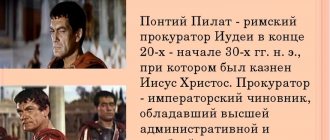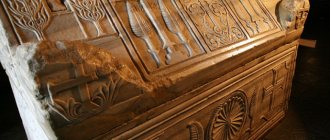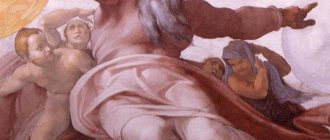Transferred images
Nikolai Ge in the film “What is Truth” conveyed the image of Pontius Pilate, who is responsible for order and preservation of the existing structure of society. Christ as a prophet prevented the current government from maintaining dominant influence, and also influenced the minds of people, forcing them to think about moral principles, good and evil, life and death. Pontius Pilate holds his head proudly, trying to reproach Christ, to explain to him that the image of the preacher is false and ridiculous. His interlocutor listens attentively to the procurator, without interrupting his monologue. Christ and Pilate do not find out what the truth is, since the first interlocutor knows this, and the second, dressed in a mantle and endowed with authority, is afraid to hear the truth.
The image of Jesus in the painting has some peculiarities. Since the Renaissance, people have become accustomed to seeing him as a physically tall man, with a refined face and exquisite features. The plot presents a slightly different image to the audience. Christ is strict, modest, exhausted. There is a legend that a relative of Ge, looking at the painting “What is Truth,” reproached the artist for depicting an ugly image: Christ has blackened eyes, disheveled hair, and a gloomy look. The remark of a loved one outraged the great master. He replied that a person is beautiful not by external, but by internal virtues. First of all, he must be smart, modest, kind, reasonable. Only the combination of good manners and generosity, sacrifice reveals a great personality in him, but not the beauty of his body or face.
Let's return to Pontius Pilate. His image in the picture screams of wealth and influence. What are his clothes, the arrogant expression on his face, and his proud posture worth? Ge in his image concentrated not only the vices of society of that time, but also an inquisitive mind that tried to unravel the mystery of Christ. Of course, no one at that time had the courage to call himself a prophet and son of God. Pilate tried to understand Christ, as well as his feelings towards this Jew, who was generous without wealth, without love he was fully gifted with it.
A) Law.
Any people has always needed and needs the iron rein of the law, otherwise anarchy will quickly destroy it. Therefore, laws have always been issued everywhere. Of all that has been invented in history, the best are considered to be: “Code of Hammurabi”, “Roman Law”, “Democracy”.
But the Old Testament of the Bible, given by God Himself, surpassed everything. Ps. 118 speaks enthusiastically about him. 142 Art. “Your law is truth.” But the Lord Himself amended it and turned it into the New Testament, bringing it to perfection. And what can you put next to it?
Try to find the flaw. “His commandments are not burdensome.” Fulfilling it gives pleasure, regulates earthly life and leads to Eternal life. Only the Lord could come up with this.
Repentance
The meeting of Pontius Pilate with Yeshua Ha-Nozri becomes decisive for the fate of both characters. Pilate, making his decision, already understood that he was making a huge mistake. However, he was afraid to do anything in defense of Yeshua.
The dispute between Pontius Pilate and Yeshua Ha-Nozri does not turn the heroes into enemies; these lonely people find in each other interesting people with whom they can talk about life and its essence.
Pontius Pilate was imbued with the words of a tramp, who made him think about his own life. Pilate fully understood that his power was hated by him, as was the city of Yershalaim, in which he had to work.
He repents for his action, tries to make amends to the executed Yeshua and orders the death of Judas from Kiriath, who was a traitor to Ha-Nozri.
All this does not relieve Pontius of remorse; he continues to experience a feeling of shame. Repentance is the main theme associated with the images of Pontius Pilate and Yeshua Ha-Nozri. It is this that can lead society to what Yeshua preached. The idea of the hero of the novel “The Master and Margarita” turned out to be not as meaningless as Pontius Pilate assumed.
At the end of the work, Yeshua forgives Pontius Pilate. This is payment for his repentance.
This article, which can help you write an essay “Pontius Pilate and Yeshua Ha-Nozri,” examines the images of Pontius Pilate and Yeshua Ha-Nozri, their conflict of worldviews and the result of this dispute.
Execution
Pontius Pilate sees that Yeshua does not look like a real criminal who incites people to overthrow the government. He wants to help Ha-Nozri, but understands that this would cost him his life, since he would go against the authority of Caesar: “Do you believe, unfortunate one, that the Roman procurator will release the man who said what you said?
Or do you think I’m ready to take your place?” Fear for his life and fear of losing his place of power force the procurator of Judea to make the wrong decision: he approves the death sentence. However, he hopes that Yeshua, according to customs, will be left alive. But the Sanhedrin makes a choice in favor of another criminal. Ha-Nozri is executed.
Pontius Pilate
Roman procurator (governor) in Judea from 26 to 36 AD. under the emperor Tiberius, according to both the gospel legend and the stories of Josephus, Philo of Alexandria and Tacitus , who approved the death sentence of Jesus Christ .
The Gospel story about the trial of Christ says that Pontius Pilate, having confirmed the death sentence of Christ , “took water and washed his hands before the people,” using an ancient Jewish custom that symbolized innocence in shedding blood (hence the expression: “washing your hands”).
“The role of Pilate in the gospel tradition is unusually characteristic and significant; if this role were conscious, it would be one of the most difficult. But it is strange: of all the roles in the gospel drama, the role of Pilate least of all needs to be conscious. Pilate could not “make a mistake”, could not act one way or another, and so he is taken in his natural state, as part of his environment and conditions, just like the people who gathered in Jerusalem on Easter, like the crowd that shouted: “Crucify him!” The role of Pilate is the same as the role of Pilates in life in general. It is not enough to say that Pilate executed - this does not reflect the essence of his nature. The main point here is that he was almost the only one who understood Jesus. I understood, of course, in my own way, in the Roman way. And yet, despite the fact that he understood, he gave him over to be scourged and executed. Pilate was undoubtedly a very smart man, educated and intelligent. He saw quite clearly that before him was not a criminal “corrupting the people,” as the “true Jewish people” of that time told him, not a contender for the Jewish throne, but simply a “philosopher,” as he might have defined Jesus . This “philosopher” aroused his sympathy, even sympathy. The Jews, who demanded the blood of an innocent, were disgusting to him. But to seriously fight for him, to create trouble for himself, was too much for Pilate. And after hesitating a little, Pilate betrayed Jesus. He probably had the idea that he was serving Rome and in this case protecting the peace of the rulers, maintaining order and peace among the conquered people, eliminating the cause of possible unrest, although sacrificing an innocent person. This was done in the name of Rome, and the responsibility seems to fall on Rome. Of course, Pilate could not know that the days of Rome were already numbered, and he himself was creating one of those forces that would destroy Rome. But Pilates' thought never goes that far. In addition, Pilate had a very convenient philosophy in relation to his actions: everything is relative, everything is conditional, nothing is of particular value. This is the practical application of the “principle of relativity” - Pilate is generally a surprisingly modern person. With such a philosophy it is easy to maneuver through life's difficulties. Jesus even helped him by saying, “I... came into the world for this purpose, to testify to the truth.” "What is truth?" - Pilate retorted ironically. And this immediately put him on the usual path of thought and attitude towards things: it reminded him where he was, who he was, showed him how he should act.
The essence of Pilate is that he sees the truth, but does not want to follow it. In order not to follow the truth that he sees, he must create in himself a special skeptical and mocking attitude towards the very idea of truth and towards the people who stand for this idea. He can no longer consider them criminals in the depths of his soul, but he must develop a certain, slightly ironic attitude towards them, which would allow him to sacrifice them if necessary. Pilate went so far as to even try to free Jesus ; but, of course, he would not allow himself to do things that compromised him - he did not want to look ridiculous in his own eyes. When his attempts failed, which probably could have been predicted, he went out to the people and washed his hands, thereby showing that he abdicated all responsibility. This is what Pilate is all about. The symbolic washing of hands is inseparably connected with the image of Pilate. He is all about this symbolic gesture. For a person of genuine internal development, there can be no “washing his hands.” This gesture of inner deception cannot belong to him. “Pilate” is a type that expresses that which in cultural humanity hinders the internal development of man and creates the main obstacle on the path to superman. The world is full of big and small Pilates. The “crucifixion of Christ” is never accomplished without their help. They see and understand the truth very well, but any “sad necessity” or political interests as they understand them, or the interests of their own position can make them betray the truth and then wash their hands.”
Peter Uspensky, Superman / New model of the Universe, St. Petersburg, Chernyshev Publishing House, 1993, p. 143-145.
According to historians, a complaint to the governor of all Syria about the bloody massacre of the Samaritans in 36 forced the Romans to recall Pontius Pilate from Judea.
The image of Pontius Pilate - as a judge of Jesus Christ , is reflected in literature, painting and music: for example: Anatole France : “Procurator of Judea”; M.A. Bulgakov : “The Master and Margarita”; Rembrandt : "Christ before Pilate"; N.N. Ge : “What is truth?”; Andrew Lloyd Webber : rock opera "Jesus Christ Superstar", etc.
What is truth
Origin and meaning of the concept
This concept has so many interpretations and concepts, a lot of thoughts, a lot of quotes. The word comes from the Old Slavonic “ist”, “ist”, which means “real, true”.
Different dictionaries have the following definitions of this concept:
- What is here and now and corresponds to reality is the same as the truth.
- The ideal of knowledge, which consists in the coincidence of thought and action, in correct understanding, knowledge of what is happening in objective reality.
- A position, judgment, statement that is based on everyday experience.
- Philosophical concept: that state when a person’s consciousness adequately reflects what objectively exists.
- Epistemological characteristics of thinking in its relation to its subject. A thought is truly true if it corresponds to the subject.
Reflecting on all the concepts and definitions of the same word, the thought appears that there must be something that would unite it all into one whole. This is best stated in the main book of humanity, which contains answers to all questions, including this one.
Truth is the image of the being of our Lord, which was embodied in the historical Person of Jesus Christ. Jesus said to Him:
“I am the way and the truth and the life; no one comes to the Father except through Me.”
(John 14:6).
For the law was given through Moses, but grace and truth came through Jesus Christ (John 1:17).
Christ answered Pilate’s question, but Pilate did not want to hear and accept this answer (John 18:36-38).
“Speaking about Orthodoxy, we should not repeat the mistake of Pontius Pilate, when he asked Christ, “What is truth?” It would be correct to ask - “Who is the truth?... “Because truth is not some idea, theory, system, but the face of the All-Holy Face of God the Word Incarnate, Jesus Christ.”
prot. Georgy Metallinos
“To seek truth means to seek an object of love. And if you seek Her with love and for the sake of love, then She will reveal to you the light of Her face as soon as you can bear it without burning out. Instead, She will bring you everything, but you will understand that you do not need anything more than Her radiant and sweetest face. Christ is the incarnate truth, His Church is “the pillar and ground of the truth” (1 Tim. 3:15). Orthodoxy contains all the fullness."
Saint Nicholas of Serbia
The meaning of truth in the modern world
Speaking about our modern society, as well as its appeal to truth, it is necessary to focus on the philosophical aspects of this problem. Throughout human existence, we have always been interested and attracted to what we believe to be true. But now, in modern times, when humanity has the opportunity to abound in information, opinions and sources, it is difficult to draw boundaries between true and false. Today, our heads are sometimes bombarded with completely unnecessary data, and the media are imposing their opinions on us from all sides. It is difficult for a simple person to even simply abstract from millions of different opinions, let alone make his own decision, relying on internal conclusions about what is true and what is false.
The other side of this problem is that today’s society is accustomed to relying on science, which has become for us not just a means of understanding the world, but the basis of production, which gives humanity power over nature, ensures its comfort and relative safety.
But science does not possess the fullness of the truth. Scientific revolutions that arise from time to time show that it was possible to count on the power of our mind only from the position of classical rationality. Nowadays science claims less and less to comprehend unconditional, objective truth. Because the more we learn about the world, the clearer it becomes to us how little we know about it and how far we are all from the absolute truth.











